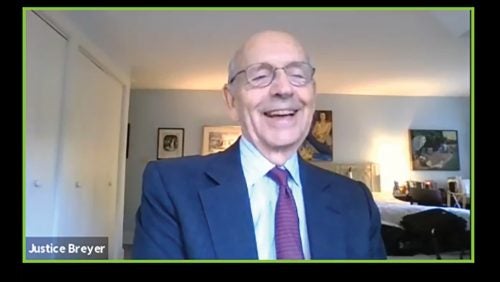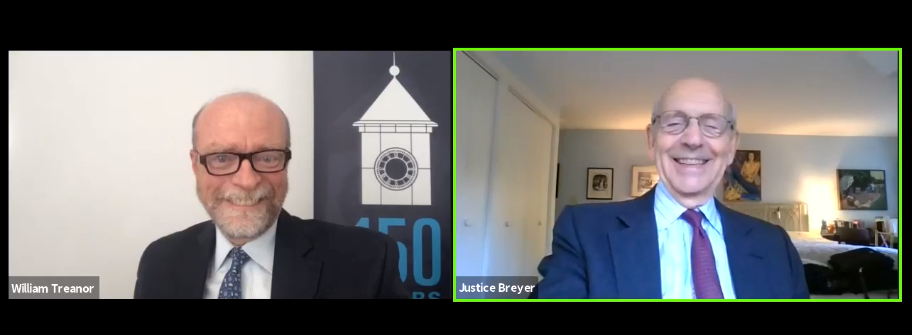Supreme Court Justice Breyer Speaks to First-Year Students
October 29, 2020

Supreme Court Justice Stephen Breyer
It’s one of the 1L traditions at Georgetown Law: starting off law school with a lecture by, as Dean William M. Treanor put it, “a giant of the bench or bar.”
Frequently, the speaker is a Supreme Court Justice. Over the past decade, Justices Ruth Bader Ginsburg, Antonin Scalia, Sonia Sotomayor and John Paul Stevens all visited campus in the fall to address an audience full of first-year students. On October 14th of this year, the esteemed speaker was Supreme Court Justice Stephen Breyer.
In 2020, of course, the 1L lecture took place via Zoom — and Treanor expressed regret that the justice couldn’t receive a welcoming round of applause from what would have been a packed auditorium. Still, the relaxed setting, with Treanor and Breyer each in his own home, made for a very congenial hour.
POLITICS AND THE COURT
However friendly the tone of the conversation, the context against which it took place — less than a month after the death of Justice Ruth Bader Ginsburg, during the Senate confirmation hearings for incoming justice Amy Coney Barrett and just before the presidential election — was contentious. Treanor asked Breyer about the politicization of the Supreme Court, noting that many of the questions submitted in advance by students touched on that issue. Breyer downplayed that notion, emphasizing the friendships he’s built with fellow justices.
“I’ve never heard a voice raised in anger in our conference. I’ve never heard one judge say something mean about another, not even as a joke. It’s professional, we get on well,’ said Breyer. “If you read the newspapers, you’d think the decisions were all politics. That’s not how it appears to us.”

Dean William Treanor and Justice Stephen Breyer
Even in some of the most controversial cases of his time on the Court, such as the Bush v. Gore decision that determined the outcome of the 2000 presidential election, Breyer maintained that he and his colleagues have managed to stay above politics. While he himself disagreed with the outcome of that particular case, he said, he was glad that once the decision was made, the American people followed it.
“There weren’t paving stones thrown, there weren’t riots, there weren’t guns fired in the streets.. And I know [some people thought], ‘Too bad there weren’t riots… Too bad there wasn’t a little bit of violence,’” said Breyer. He continued, “Before you come to that conclusion… look and see what happened in countries that settled their differences that way.”
America’s ability to hold together and overcome times of conflict is one of its strengths, said the justice.
“We think all kinds of things, but these very different people have managed to live together for a long time now. We did have a civil war. We had some real horrors. We did have slavery. We did have segregation. We’ve had a lot of ups and downs, but we’ve come out of it… We still have this rule of law, and we still have our 330 million people who have different opinions, and that, I think, is fabulous,” said Breyer.
STUDY TIPS FROM A JUSTICE
Early in the conversation, Treanor invited Breyer to talk about his decision to become a lawyer, and the justice replied that he’d been following in his father’s footsteps.
“My father was a lawyer, and he thought it would be a nice idea if I became a lawyer, and I thought, well, all right, I’ll become a lawyer. And there we are,” said Breyer. He then went on to say that even though it started out as his father’s idea, he found that the profession suited him very well.
“The great thing about law is you need a head, and you need a heart. You know, if you’re working for clients, you’re trying to do something for them. You’re trying to improve at least a tiny bit of the world,” said Breyer, continuing, “But you’re not going to do very well unless you also have a head… There are not too many careers where you can really combine those two things.”
Treanor then asked Breyer if he had any advice for the newly minted law students in the audience. Breyer, who attended Harvard Law and was later a professor there, shared another piece of advice he got from his own father about the best way to get through law school.
“Each night, read your notes, and on the weekend, read them again quickly,” counseled Breyer. “Lo and behold, exams will come around, and you’ll know it pretty well already. It’s called reviewing, reviewing, reviewing — and that isn’t learning necessarily how to think, but it is learning how to take exams.”
“WORK IT OUT”
As the conversation progressed, Treanor asked Breyer about his early career. After Harvard Law School, Breyer clerked for Supreme Court Justice Arthur Goldberg, then was a special assistant in the Justice Department’s Antitrust Division, worked for Watergate special prosecutor Archibald Cox and served as special counsel and chief counsel to the Senate Judiciary Committee under chairman Sen. Edward Kennedy.
Breyer said that he had especially fond memories of his time at the Senate Judiciary Committee, and that he quotes Kennedy so often his clerks once had some of his top Kennedy sayings printed on a coffee mug as a gift for him.
“‘Hey, work it out. You’re disagreeing with the Republicans on something — work it out,’” was one of the best lessons Breyer learned from the senator, he said. “[Kennedy] would say it’s better to get 30% of what you want. And that’s a much better thing than being the national hero among your own side and getting nothing.”
Breyer had the opportunity to put that advice into practice frequently, he said, during regular breakfast meetings with his Republican counterpart, Emory Sneeden, a staffer for the Judiciary Committee’s ranking minority member, Senator Strom Thurmond.
“We would discuss what was going to go on during the day. And the rule was, no surprises, no tricks. We used to call that ‘open conniving,’” recalled Breyer. “It was much easier to have a cooperative relationship. I loved that job.”
Breyer acknowledged that partisanship on Capitol Hill is far more polarized today than in the 1970s, but continued to display optimism.
“I grant you, that was a different world, but my goodness, I really liked it. It was very, very interesting,” said Breyer.
Watch a recording of the event below: